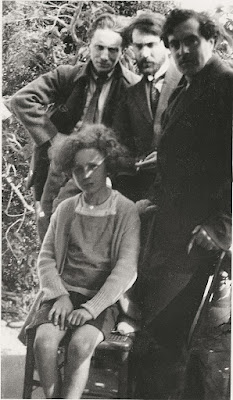IMPROMPTU: SELECTED POEMS OF GOTTFRIED BENN TRANSLATED BY MICHAEL HOFMANN
Gottfried Benn, Impromtus: Selected Poems, translated by Michael Hofmann (Faber & Faber, 2013)
Paul Murphy, San Dona di Piave, near Venice
The poetry of Gottfried Benn (1886-1956) explains a gap in the coherence of Twentieth-century literature. Benn was a doctor, a scientist who served the interests of German militarism and latterly the Nazi regime and was possibly one of the few men to have served in both wars. As a poet he might have reflected that once was enough but his disappearance into the military a second time has a different explanation. Benn was more than a poet, a surgeon specialising in skin diseases and venereal disease. His role was therefore vital to an army displaced from its normal civilian functions, his age largely irrelevant. He cared for the health of prostitutes who have followed every army in history and he therefore had a role as a sensitive interrogator of often brutal realities.
Benn’s poetry career began before 1914, when his profession of surgeon and dissector of bodies led him to author Morgue (1912), a work possibly also suffused with romantic pessimism which earned Benn immediate notoriety. The work is as much about the bodies of the dispossessed or disappeared as about the body politic but it is also about the things that dead bodies hold onto, from flowers deliberately sewn into corpses to a colony of baby rats that have somehow managed to take over the body of a drowned girl.
The mouth of the girl who had lain long in the rushes
Looked so nibbled.
When they opened her chest, her oesophagus was so holey,
Finally in a bower under the diaphragm
They found a nest of young rats.
(Beautiful Youth)
It seems a work of supreme melancholia, chiming with the romantic pessimism that young poets have always felt but also with the thoughts and aspirations of the Expressionist movement which Benn is often associated with and the philosophical nihilism of the movement’s main source of inspiration, Frederich Nietzsche (1844-1900). In another poem, Little Aster, the operating surgeon who might, presumably, be Benn himself or possibly some fictional surgeon, sews a lavender aster into the corpse of a drowned drayman.
In a later guise Benn managed to be the officiating surgeon at the execution of Edith Cavell (1866-1915) in Belgium, 1915. Cavell was a spy and the Germans were within their rights to execute her. However, the execution of a woman and a nurse who had tended the wounded on both sides outraged moral opinion on either side of the Atlantic. The Germans had misjudged the powerful image of Cavell’s execution, failing to win the propaganda war that led eventually to America weighing in on the side of Britain and France, for the German High Command believed that ultimate victory could be gained through the application of merciless logic without any kind of appeal to the human heart. Scientific rationalism and nationalist zeal required an emotional explanation, for as Cavell herself said ‘patriotism is not enough’.
In terms of German poetry, Gottfried Benn seems to be the unsaid, inexplicable question mark that resides between the lives of Rainer Maria Rilke (1875-1926) and Bertolt Brecht (1898-1956). His work is not as internalised and difficult as Rilkes nor is it as outwardly political as Brechts. It’s easy to see why Gottfried Benn is unheard of in the English-speaking world. He is not even disliked as Brecht is, as the author of ‘rant and cant’, of phoney propaganda. In short, he was a fascist.
As Michael Hofmann demonstrates Benn initially welcomed the new Nazi regime after 1933, for their claims seemed to chime with some romantic, pessimistic element in his own soul or some residual feeling or affiliation to Spengler and Nietzsche but after the Night of the Long Knives and other disturbingly intrusive events, where Nazi methods and ambitions were clarified, Benn’s support and enthusiasm faded away. Eventually, after 1938, his writings were banned, and he joined the army in what Benn himself termed ‘the aristocratic form of emigration’. Benn's political affiliations are not clear cut, his moral and intellectual progress ambivalent, confused and eventually a logical progression in the face of absolute illogicality.
The poems also become more complex and more upbeat. Some of the exceptional works in this beautifully presented volume are Jena and Turin that detail quintessentially a certain middle European torpor but also a work like Evenings of Certain Lives that dwells equally on the lives of Rembrandt and Shakespeare as paradigms of an artist's progress. There's also St Petersburg - Mid-Century, a charming visualisation of that city presumably a century before, populated by Raskolnikov possessed of demented ambitions and other characters like Mme Stepanov and the terrible cerebral din of eastern religiosity ringing out clearly. Later there's a poem like Foreign Ministers that really does attempt and succeed in explaining politics even as it simultaneously seeks to declarify them.
Gottfried Benn deserves a wider readership in the English speaking world, this volume is probably an attempt to explain his work to that audience. However its a real pity that there is no dual text offered. This might have been more enabling for the reader although some undoubtedly find it distracting, my single gripe against a volume that re-represents an important German writer of the last century.
Paul Murphy, San Dona di Piave, near Venice

Comments